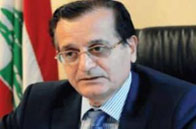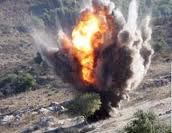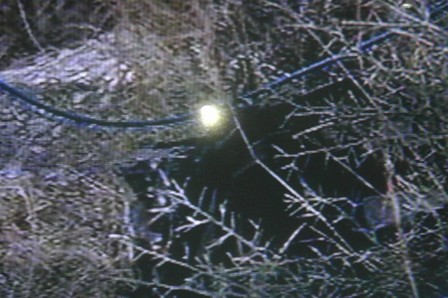CCM: Clear Hopes for a Cluster-Bomb-Free Lebanon

Siraj Kobeissy
On August 14 2006, the "Israeli" aggression on Lebanon came to an end due to a cease fire resolution to stop the bombards shelling the Lebanese territories.
However, the cease fire did not mean the end of the "Israeli" barbarity, as the enemy left "unkind" surprises for all the men, women, and children who support the liberty and freedom of their land.
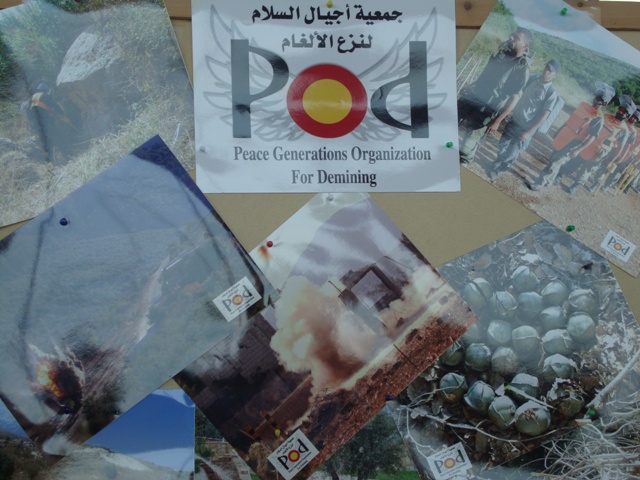
The "Israeli" enemy left behind killer landmines and cluster bombs; causing deaths and injuries in Lebanon, especially in the South liberated region.
Being a victim of the cluster munitions, Lebanon was one of the first countries to sign and ratify the 2008 Convention on Cluster Munitions (CCM); which prohibits all use, stockpiling, production and transfer of Cluster Munitions.
In an attempt to prove its commitment to the articles and implementation of the CCM, Lebanon decided to host this year's [2011] Second Meeting of States Parties to the Convention on Cluster Munitions.
The five-day conference meeting was launched on Monday 12 September, during which participants from some 80 different countries had the chance to visit sites and encounter victims of "Israeli" cluster mines and munitions.
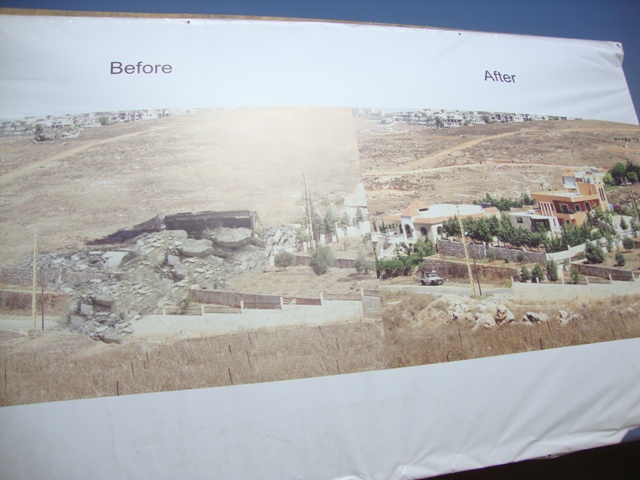 Participants departed from Beirut towards the South. Two trips were organized by the Lebanese Army; one to Sarafand to visit the Lebanese Welfare Association for the Handicaps center, and another to Nbatiyeh for a live view about the Lebanese Army demining missions in field.
Participants departed from Beirut towards the South. Two trips were organized by the Lebanese Army; one to Sarafand to visit the Lebanese Welfare Association for the Handicaps center, and another to Nbatiyeh for a live view about the Lebanese Army demining missions in field.
The Nabatiyeh fieldtrip was more of a mock demonstration of the daily work done by the Engineering Unit of the Lebanese Army, regarding the cluster bombs and munitions that some are still currently spread around areas under the Army's supervision.
In Nabatiyeh, precisely in Issam Shamoun's barrack, the Lebanese Army, in participation with other governmental, nongovernmental, and civil organizations, organized workshops through which they explained to the audience details about the daily demining chores of the demining unit.
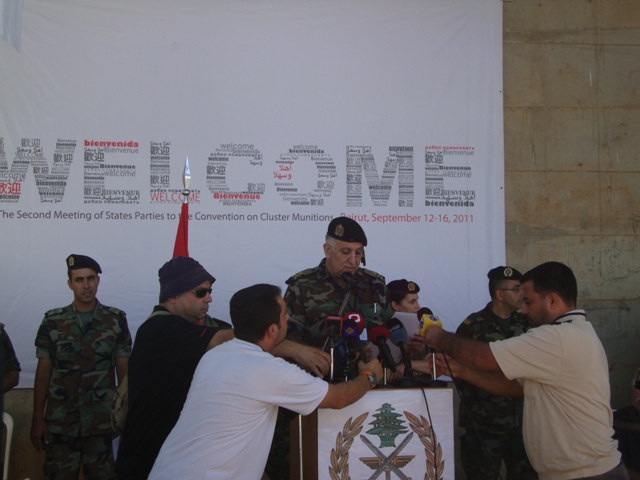
Head of the demining center in Nabatiyeh, General Mohammad Fahmi addressed the participants as they arrived to the site, and welcomed them to the South Lebanon. Gen. Fahmi stressed the importance of these activities for the Lebanese Army, fas they sacrifice themselves for the wellbeing of their people.
On another hand, organizer in the event, Habouba Aoun, explained the stations' content of the fieldtrip:
1- Clearance Operation
2- Evacuation Site
3- An Observation Site with different demining organizations
In the first station or workshop, the Battle Area Clearance, Lebanese Army Major Roger Eid, from the Engineering Unit, explained in detail how his teams work on demining and clearing the areas from cluster munitions.
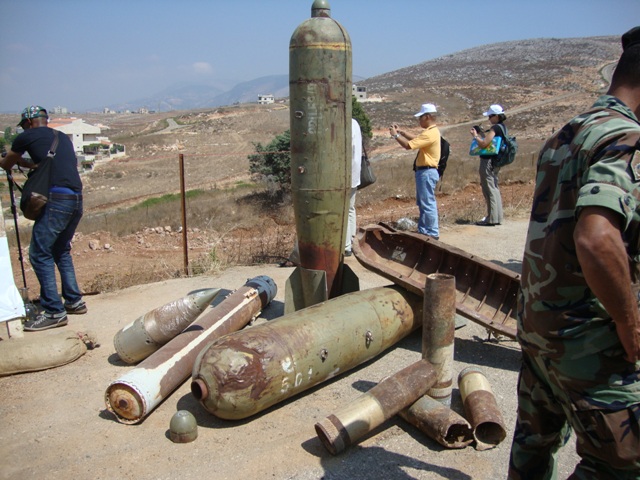
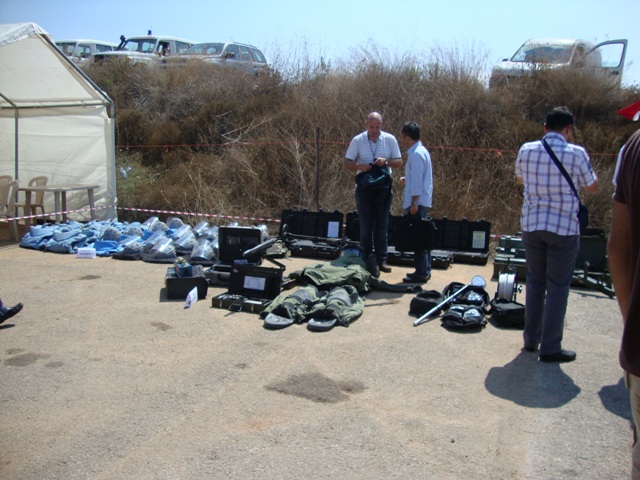
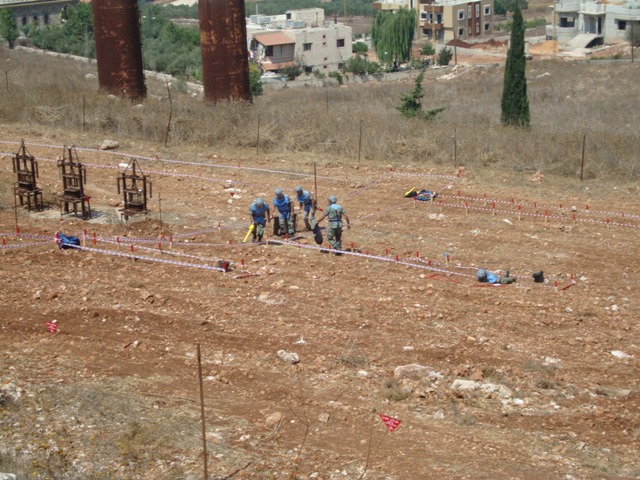
Eid explained the safety signs the Lebanese army uses to avoid any kind of mistake while in the field looking for or dismantling mines and cluster bombs.
At the end of his theoretical demonstration, the Lebanese Army bombed a mine meters away from where the participants stood, in a live demonstration to make it clear to people how ground operations are done.
On the second station of workshop, the army conducted a mock presentation of how the clearing is done, and how an army unit member is immediately treated in the medical center if injured by cluster bombs or mines during live operations.
The mock demonstration was performed by a group of Lebanese Army soldiers, in cooperation with the Islamic Health Society.
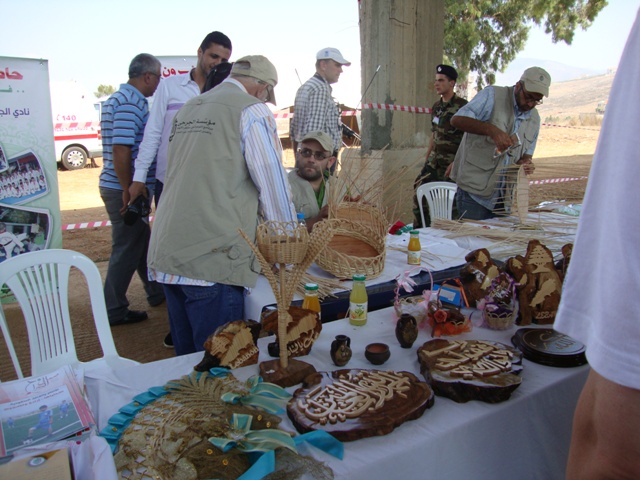
On the third level, the Wounded Organization also took part in the event, where its members greeted the participants and expressed their support to the cause.
Abbas Sayyed, a victim of mines and cluster munitions who is now working for the Wounded Association, expressed to moqawama.org his feelings that following his injury, he felt like a new life was opened before him, and he seized it and didn't give up.
On her part, Senior Government Liaison Officer in the Cluster Munitions Coalition, Susan Walker affirmed that all governments and organizations should make sure that the Convention on Cluster Munitions is being implemented.
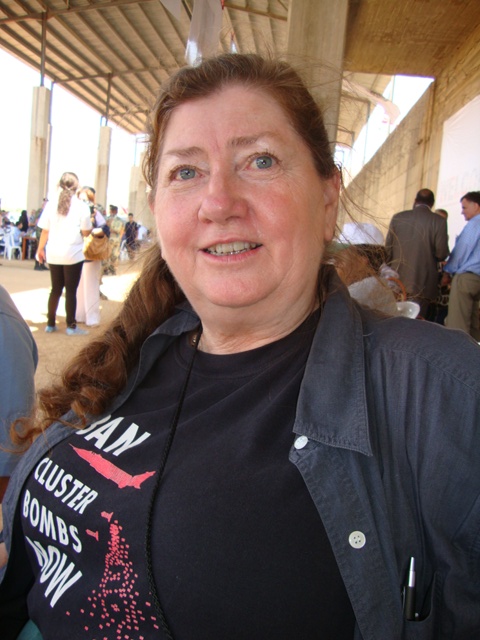
Susan Walker has expertise in this field since 1979 in Thailand and Vietnam, at the time when Cambodian refugees were escaping wars and conflicts. She has been on field, working in demining of mines and cluster munitions from civil areas. In the year 1984, she was assigned to be Regional Director for Handicapped International, and then years later she was named to be international director for Handicapped International.
Her organization won the Nobel Peace Prize in 1997 for passing a law calling for anti-personnel mines, which is also a convention which leads to the total ban of cluster munitions use.
Ms Walker stated to moqawama.org that she was pleased that Lebanon [Beirut] was hosting the meeting this year, after Laos has held the 1st meeting for the States Parties to the CCM.
In addition, she reiterated that the most important issue is to maintain the implementation of the CCM, and get rid of all "life-threatening devastating bombs".
Walker noted that the cluster bombs have also got billions of sub munitions thrown in stock piles, which would of course represent a major threat to the people, especially innocent civilians.
She went on to say that the Lebanese army are doing their best to accomplish the clearance of the cluster-bomb contaminated areas, and will succeed hopefully to take out every single bomb.
"The voice of the victim has finally been heard", Walker said, indicating the development of states attention given to the conventions' implementation.
On his part, Jordan Ryan, Assistant Administrator and Director of the Bureau for Crisis Prevention and Recovery at the UN Development Program (UNDP), affirmed that the latter is a very active agency in supporting the implementation of t he CCM in Lebanon.
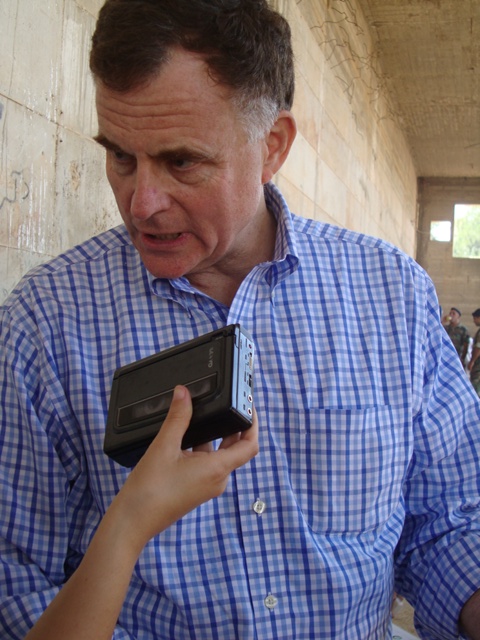
He indicated that Lebanon, especially the Lebanese army, is exerting effort in this regard. Mr. Ryan told moqawama.org that he was pleased to see the Lebanese army members active in their duty, where they also reach out to help the victims.
Jordan Ryan believed that Lebanon is now witnessing a development in its technical capabilities, through which the country is capable of clearing a big number of contaminated areas.
Mr. Jordan Ryan further added that "Lebanon has presented a very unique role model for all other CCM signatories, as it has been committed to the implementation of the CCM by all means available."
The Lebanese people have been through many calamities that led to many casualties and tragedies. However, the Lebanese people's will to free and clear their land and territories defeated the image of a demeaned Lebanon, and as Lebanese Foreign Minister Adnan Mansour said, "Lebanon transformed cluster munitions calamities into success and victory".
Together we hope for a clearer Lebanon... Together we hope that the 67% cleared territories so far would reach the 100%, and Lebanon would once again blossom without any foreign essences.
On August 14 2006, the "Israeli" aggression on Lebanon came to an end due to a cease fire resolution to stop the bombards shelling the Lebanese territories.
However, the cease fire did not mean the end of the "Israeli" barbarity, as the enemy left "unkind" surprises for all the men, women, and children who support the liberty and freedom of their land.
The "Israeli" enemy left behind killer landmines and cluster bombs; causing deaths and injuries in Lebanon, especially in the South liberated region.
Being a victim of the cluster munitions, Lebanon was one of the first countries to sign and ratify the 2008 Convention on Cluster Munitions (CCM); which prohibits all use, stockpiling, production and transfer of Cluster Munitions.
In an attempt to prove its commitment to the articles and implementation of the CCM, Lebanon decided to host this year's [2011] Second Meeting of States Parties to the Convention on Cluster Munitions.
The five-day conference meeting was launched on Monday 12 September, during which participants from some 80 different countries had the chance to visit sites and encounter victims of "Israeli" cluster mines and munitions.
The Nabatiyeh fieldtrip was more of a mock demonstration of the daily work done by the Engineering Unit of the Lebanese Army, regarding the cluster bombs and munitions that some are still currently spread around areas under the Army's supervision.
In Nabatiyeh, precisely in Issam Shamoun's barrack, the Lebanese Army, in participation with other governmental, nongovernmental, and civil organizations, organized workshops through which they explained to the audience details about the daily demining chores of the demining unit.
Head of the demining center in Nabatiyeh, General Mohammad Fahmi addressed the participants as they arrived to the site, and welcomed them to the South Lebanon. Gen. Fahmi stressed the importance of these activities for the Lebanese Army, fas they sacrifice themselves for the wellbeing of their people.
On another hand, organizer in the event, Habouba Aoun, explained the stations' content of the fieldtrip:
1- Clearance Operation
2- Evacuation Site
3- An Observation Site with different demining organizations
In the first station or workshop, the Battle Area Clearance, Lebanese Army Major Roger Eid, from the Engineering Unit, explained in detail how his teams work on demining and clearing the areas from cluster munitions.
Eid explained the safety signs the Lebanese army uses to avoid any kind of mistake while in the field looking for or dismantling mines and cluster bombs.
At the end of his theoretical demonstration, the Lebanese Army bombed a mine meters away from where the participants stood, in a live demonstration to make it clear to people how ground operations are done.
On the second station of workshop, the army conducted a mock presentation of how the clearing is done, and how an army unit member is immediately treated in the medical center if injured by cluster bombs or mines during live operations.
The mock demonstration was performed by a group of Lebanese Army soldiers, in cooperation with the Islamic Health Society.
On the third level, the Wounded Organization also took part in the event, where its members greeted the participants and expressed their support to the cause.
Abbas Sayyed, a victim of mines and cluster munitions who is now working for the Wounded Association, expressed to moqawama.org his feelings that following his injury, he felt like a new life was opened before him, and he seized it and didn't give up.
On her part, Senior Government Liaison Officer in the Cluster Munitions Coalition, Susan Walker affirmed that all governments and organizations should make sure that the Convention on Cluster Munitions is being implemented.
Susan Walker has expertise in this field since 1979 in Thailand and Vietnam, at the time when Cambodian refugees were escaping wars and conflicts. She has been on field, working in demining of mines and cluster munitions from civil areas. In the year 1984, she was assigned to be Regional Director for Handicapped International, and then years later she was named to be international director for Handicapped International.
Her organization won the Nobel Peace Prize in 1997 for passing a law calling for anti-personnel mines, which is also a convention which leads to the total ban of cluster munitions use.
Ms Walker stated to moqawama.org that she was pleased that Lebanon [Beirut] was hosting the meeting this year, after Laos has held the 1st meeting for the States Parties to the CCM.
In addition, she reiterated that the most important issue is to maintain the implementation of the CCM, and get rid of all "life-threatening devastating bombs".
Walker noted that the cluster bombs have also got billions of sub munitions thrown in stock piles, which would of course represent a major threat to the people, especially innocent civilians.
She went on to say that the Lebanese army are doing their best to accomplish the clearance of the cluster-bomb contaminated areas, and will succeed hopefully to take out every single bomb.
"The voice of the victim has finally been heard", Walker said, indicating the development of states attention given to the conventions' implementation.
On his part, Jordan Ryan, Assistant Administrator and Director of the Bureau for Crisis Prevention and Recovery at the UN Development Program (UNDP), affirmed that the latter is a very active agency in supporting the implementation of t he CCM in Lebanon.
He indicated that Lebanon, especially the Lebanese army, is exerting effort in this regard. Mr. Ryan told moqawama.org that he was pleased to see the Lebanese army members active in their duty, where they also reach out to help the victims.
Jordan Ryan believed that Lebanon is now witnessing a development in its technical capabilities, through which the country is capable of clearing a big number of contaminated areas.
Mr. Jordan Ryan further added that "Lebanon has presented a very unique role model for all other CCM signatories, as it has been committed to the implementation of the CCM by all means available."
The Lebanese people have been through many calamities that led to many casualties and tragedies. However, the Lebanese people's will to free and clear their land and territories defeated the image of a demeaned Lebanon, and as Lebanese Foreign Minister Adnan Mansour said, "Lebanon transformed cluster munitions calamities into success and victory".
Together we hope for a clearer Lebanon... Together we hope that the 67% cleared territories so far would reach the 100%, and Lebanon would once again blossom without any foreign essences.
Source: moqawama.org

